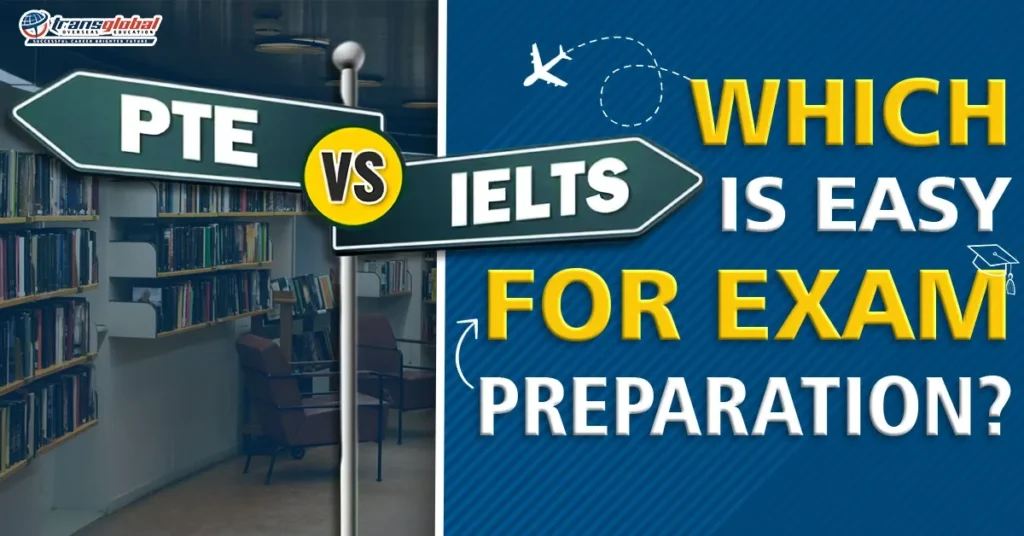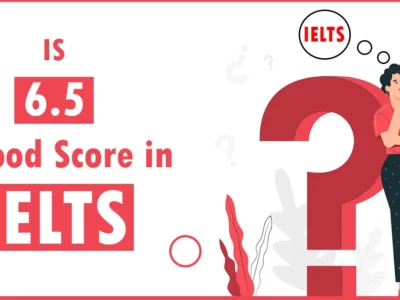
If you’re thinking about studying abroad, you’ll likely need to prove your English language skills by taking a proficiency test. Two of the most common tests you’ve probably heard about are PTE and IELTS. IELTS, which stands for the International English Language Testing System, is managed by the British Council, IDP, and Cambridge Assessment English. On the other hand, PTE, or Pearson Test of English, is conducted by ETS. Both tests aim to evaluate your English skills, but they have their differences.
Deciding between PTE and IELTS can be tough. You might wonder, “PTE vs IELTS, which is easy?” or “Is IELTS easier than PTE?” These questions are common among students. In this blog, we’ll help clear up the confusion by comparing important aspects of both tests, such as their format, scoring system, and validity. By the end, you’ll have a better idea of which test is right for you.
PTE vs IELTS: An Overview
Both PTE and IELTS are tests meant to measure how well you know English. But they have some differences. For example, IELTS offers two types of tests: one on paper and one on a computer. But PTE only provides a test on a computer, and a machine grades it.
Another difference is in how you talk during the speaking part. In IELTS, you talk face-to-face with an examiner, while in PTE, you talk to a computer.
Let’s take a closer look at the main differences between PTE and IELTS in the table below:
| Factors | PTE | IELTS |
|---|---|---|
| Conducted by | Pearson PLC Group | IDP Education Ltd. |
| Test Types & Format | PTE Academic | IELTS Academic, IELTS General Training, and IELTS Indicator |
| Test Duration | 3 hours | 2 hours and 45 minutes |
| Scoring Pattern | 10 - 90 points | 0 - 9 band score |
| Test Fee | INR 15,900 (USD $194) | INR 16,250 (USD $198) |
| Mean of accepted scores | 50 | 6.3 |
| Result | 48 hours after the test | 13 days after the test |
| Global Acceptance | Accepted by over 11,500 organizations in 140+ countries, including UK, Australia, New Zealand, USA, and Canada. | Accepted by over 3,000 institutions, including Harvard Business school, INSEAD. |
PTE vs IELTS: Exam Pattern & Structure
Let’s break down the exam patterns and structures of PTE and IELTS to help you understand what to expect on test day.
PTE Exam Pattern
In the PTE exam, you’ll be facing three main sections: Speaking and Writing, Reading, and Listening. Each section tests different aspects of your English skills.
- Speaking and Writing: You’ll start with tasks like “Read Aloud” and “Repeat Sentence,” moving on to tasks like “Describe Image” and “Re-tell Lecture.” The writing section includes tasks such as “Summarize Written Text” and “Write Essay.”
- Reading: This section assesses your reading skills through tasks like “Multiple-Choice, Choose Single Answer” and “Re-order Paragraphs.” You’ll also tackle tasks like “Reading: Fill in the Blanks.”
- Listening: The listening section challenges you with tasks like “Summarize Spoken Text” and “Multiple-Choice, Choose Multiple Answers.” You’ll also encounter tasks like “Fill in the Blanks” and “Highlight Correct Summary.”
The whole PTE experience is computer-based, providing a unique testing environment.
IELTS Exam Pattern
Moving on to IELTS Exam, the structure is slightly different. IELTS comes in two versions: Academic and General Training.
- Listening: This is the first section, where you’ll listen to a range of recordings and answer questions. The recording includes conversations, monologues, and discussions.
- Reading: The reading section includes various text types, and you’ll answer questions to test your comprehension skills. It assesses your ability to understand detailed information, main ideas, and opinions.
- Writing: The writing section involves tasks such as describing graphs and charts, writing essays, and responding to a point of view.
- Speaking: Finally, the speaking section is a face-to-face interview where you’ll engage in a conversation with an examiner. It assesses your ability to communicate effectively in English.
While IELTS is pen-and-paper for the writing and reading sections, the speaking test is a personal interaction.
Confused about how to prepare for different exam sections? Take help from Transgloabls’ experienced trainers. You’ll get focused training and curated study materials. Contact us today to get started.
PTE vs IELTS: Score Chart & Calculator
Now let’s look at how scores are calculated for both PTE and IELTS.
PTE Score Chart & Calculator
In PTE, your performance in each section is scored individually, and then an overall score is generated. The scoring scale for PTE ranges from 10 to 90, with 10 being the lowest and 90 being the highest.
Here’s a breakdown of the scoring system for PTE:
| PTE Score | Skill Level |
|---|---|
| 10 - 30 | Beginner |
| 31 - 40 | Elementary |
| 41 - 50 | Intermediate |
| 51 - 60 | Upper Intermediate |
| 61 - 79 | Advanced |
| 80 - 90 | Expert |
IELTS Score Chart & Calculator
Similarly, IELTS also follows a scoring scale to assess your English proficiency. The scoring range for each section and the overall band score is as follows:
| IELTS Score | Listening | Reading | Writing | Speaking | Overall Band |
|---|---|---|---|---|---|
| 0 | 0 | 0 | 0 | 0 | 0 |
| 1 | 1.5 | 2 | 2 | 2 | 1 |
| 2 | 2.5 | 3 | 3 | 3 | 1.5 |
| 3 | 3.5 | 4 | 4 | 4 | 2 |
| 4 | 4.5 | 5 | 5 | 5 | 2.5 |
| 5 | 5.5 | 6 | 5.5 | 5.5 | 3 |
| 6 | 6 | 6.5 | 6 | 6 | 3.5 |
| 7 | 6.5 | 7 | 6.5 | 6.5 | 4 |
| 8 | 7 | 7.5 | 7 | 7 | 4.5 |
| 9 | 8.5 | 8 | 7.5 | 7.5 | 5 |
Here is a comparison of PTE and IELTS scores:
| IELTS | 5 | 5.5 | 6 | 6.5 | 7 | 7.5 | 8 | 8.5 |
|---|---|---|---|---|---|---|---|---|
| PTE-A | 40.8 | 45.4 | 51.6 | 58.5 | 66.3 | 74.6 | 82.3 | 88.1 |
Want to score 8+ in IELTS on your first attempt?At Transglobal, our skilled IELTS counselors can transform that aspiration into achievement. Kickstart your coaching journey with us today and witness exceptional results. Experience the finest IELTS coaching in Tilak Nagar right here with us.
IELTS vs PTE: Price and Acceptance
Price and acceptance are some crucial aspects that often play a crucial role in your decision-making process.
PTE Price and Acceptance
When it comes to pricing, PTE offers a relatively affordable option. The base PTE exam fee stands at INR 13,474.58, and there’s an additional 18% tax, which amounts to INR 2,425.42. So, in total, you’ll be paying around INR 15,900 for the PTE test.
Plus, PTE Academic is widely accepted by more than 3,300 institutions worldwide. This means that a PTE score opens doors to numerous universities and colleges across the globe, offering you a broad spectrum of choices for your academic journey.
IELTS Price and Acceptance
The pricing for IELTS is slightly higher. The registration fee for both the Academic and General Training tests is ₹16,250. If you opt for the UKVI version (IELTS for UK Visa and Immigration), the fee goes up a bit to ₹16,500.
On the acceptance front, IELTS has an impressive reach. It is recognized by over 12,000 organizations in more than 140 countries. This widespread acceptance makes IELTS a go-to choice for many institutions and employers around the world.
PTE vs IELTS Which is Easy?
Now, let’s address the burning question: PTE vs IELTS which is easy? While both exams assess your English language skills, many students find PTE to be relatively easier than IELTS for several reasons.
- Faster Results: One of the most significant advantages of PTE is its quick result announcement. You’ll typically receive your PTE scores within two to three days, compared to the 15 days it takes for IELTS results to be released. This quick turnaround can be a game-changer, especially if you’re working with tight deadlines. With IELTS, if you need to retake the test, you’ll have to wait another month, potentially missing important deadlines.
- Exam Dates Availability: Securing an exam date for IELTS can be a challenge due to its popularity and limited availability. Booking an IELTS exam often requires planning well in advance, as dates tend to fill up quickly. On the other hand, PTE offers more flexibility, with exam dates often available within a shorter timeframe. You might even find PTE exam slots available on the same or the next day, making it a convenient option for those with busy schedules.
- Exam Structure and Scoring: PTE’s exam structure and scoring system also contribute to its perceived ease compared to IELTS. PTE features mixed questions across all sections, blending tasks to assess multiple skills simultaneously. For example, the PTE listening section evaluates not only listening skills but also requires writing evaluation simultaneously. Similarly, the speaking section of PTE involves different patterns, challenging students in various ways.
- Reading Passage Length and Scoring: IELTS reading passages, especially in the academic version, can be lengthy and demanding. PTE reading passages, however, are typically shorter, focusing more on vocabulary words than extensive texts. Additionally, PTE’s scoring system, though more complex, offers students the opportunity to excel in multiple areas simultaneously, whereas IELTS scores are based on specific parameters.
So, PTE is often considered easier than IELTS because
- With just 15 days of dedicated practice, many students find success in the PTE exam.
- PTE’s computer-based scoring system eliminates human biases and ensures result accuracy.
- This test gives students a chance to excel in multiple areas allowing them to score higher.
The PTE test can make your dream of studying abroad come true, and our expert counsellors can help you crack it in one attempt. Get in touch with Transglobal today to receive the best PTE coaching in Delhi and access curated study materials.
IELTS is Best for you, if :
Why might IELTS be the better choice for you? Let’s break it down.
- You Prefer a Face-to-Face Speaking Test: If you feel more comfortable interacting face-to-face when speaking English, then IELTS might be your go-to. Unlike PTE, which has a speaking section recorded via microphone, IELTS involves a real-life conversation with an examiner. This can be beneficial if you thrive in interpersonal communication settings and want to showcase your speaking skills in a more natural environment.
- You Excel in Time Management: Time management is key during any exam, and IELTS is no exception. With strict time limits for each section, including speaking, listening, reading, and writing, you’ll need to be adept at managing your time effectively. If you’re confident in your ability to stay on track and perform well under pressure, IELTS might be the right fit for you.
- You Value Traditional Test Formats: Some students find comfort in traditional pen-and-paper tests, and IELTS offers just that. If you’re more accustomed to writing by hand and prefer the tactile experience of filling out answer sheets, then IELTS could be the preferred option. Additionally, the familiarity of the format might ease test-day nerves, allowing you to showcase your language skills.
PTE is Best for you, if:
Here’s when PTE could be the right choice:
- You’re Comfortable with Technology: PTE is a computer-based test, which means you’ll interact with the exam through a computer interface. If you’re comfortable using technology and prefer typing over writing by hand, PTE might suit you better.
- You Need Quick Results: PTE typically provides faster results compared to IELTS. If you’re in a hurry to get your scores for university applications or other purposes, PTE’s quick turnaround time could be a significant advantage.
- You Prefer a Machine-Based Scoring System: PTE uses automated scoring technology, where computers evaluate your responses. This can be appealing if you prefer objective, consistent scoring without the potential biases that human examiners might bring.
- You’re Preparing for Computer-Delivered Tests: Many universities and organizations now offer computer-delivered exams for various subjects. Taking PTE can give you valuable experience with computer-based testing, which may benefit you in future assessments.
Conclusion
In PTE vs IELTS, there is no clear winner; it’s all about finding the right fit for you. Consider your strengths, preferences, and the specific requirements of your chosen institutions or employers. Remember, the goal is not just to pass the test but to excel in it, showcasing your true language proficiency. So, assess your requirements and choose the best test that will help you achieve your dreams in the best possible manner.
Take the help of Transglobal IELTS Training Academy!!
At Transglobal, we understand the importance of a tailored and effective preparation strategy. We know that each student is unique, and so are your areas for improvement. That’s why our coaching methods are designed to provide you with personalized guidance.
- Comprehensive Study Materials: We provide you with comprehensive study materials that cover all aspects of the IELTS test. Whether you need to brush up on your reading, enhance your writing skills, or fine-tune your speaking abilities, our materials are crafted to address every section of the exam.
- Expert Guidance: Our experienced instructors will guide you every step of the way. From understanding the test format to mastering test-taking strategies, we offer expert insights that can make a significant difference in your performance.
- Practice Tests and Mock Exams: With our simulated practice tests and mock exams, you’ll get a real feel for the IELTS test environment. This will help you stay ready and build your confidence for the actual examination day.
- Individualized Feedback: We believe in targeted improvement. Our team provides personalized feedback on your practice tests, highlighting your strengths and suggesting areas for enhancement. Our approach ensures tailored skill development.
- Time Management Strategies: Time is of the essence in any standardized test. Our training includes effective time management strategies to help you navigate through each section efficiently, ensuring you complete the test within the allocated time.
- Regular Workshops and Seminars: Stay updated and informed through our regular workshops and seminars. These sessions cover the latest trends, tips, and strategies for success in the IELTS exam, keeping you well-prepared and confident.
- Mock Interviews for Speaking Section: Facing an interview can be nerve-wracking, especially when it’s part of an exam. Our mock interviews for the speaking section simulate the real IELTS interview experience, preparing you for the actual conversation with confidence.
Take your IELTS preparation to the next level with Transglobal IELTS Training Academy! Join the best IELTS coaching in Delhi today and embark on your journey towards success.
FAQs:
Which is harder, PTE or IELTS?
Both tests assess different skills, with PTE focusing on computer-based delivery and integrated skills, while IELTS offers paper or computer options with separate sections. The difficulty depends on individual strengths and weaknesses.
Is PTE easy to pass?
The ease of passing PTE is subjective and depends on your proficiency in typing, reading comprehension, and microphone clarity. Research both tests’ formats and scoring systems to determine which aligns better with your skills.
IELTS vs PTE, which is better?
There’s no single “better” option. Analyze your strengths, test format preferences, and acceptance requirements to make an informed decision.
Which English test is easier?
It varies based on your preferences. If you’re comfortable with computers and integrated testing, PTE might feel easier. If you prefer pen-and-paper or separate speaking/writing sections, IELTS might be more suitable. Test both formats to see which feels more natural.
Is it easy to get 65 in PTE?
Achieving a 65 in PTE, equivalent to a 7 in IELTS, indicates good English proficiency. The difficulty depends on your current level, so aim for a higher target score and prepare thoroughly using official materials and practice tests.
PTE vs IELTS vs TOEFL
Each test has its strengths and weaknesses. PTE focuses on computer delivery and integrated skills, IELTS offers both computer and paper options with separate sections, and TOEFL is primarily computer-based. Consider your strengths, test format preferences, and acceptance requirements
Is PTE better than IELTS?
Neither is inherently “better.” Choose based on your learning style, test format preferences, and the specific requirements of the university or program you’re applying to.
PTE Accepted Countries
PTE is widely accepted in countries such as Australia, Canada, New Zealand, the UK, Ireland, and Singapore. For the latest list, check the official PTE website.
PTE 65 vs IELTS 7
Both scores indicate strong English proficiency. PTE 65 focuses on computer-delivered testing and integrated skills, while IELTS 7 assesses speaking, writing, reading, and listening separately.
PTE to IELTS
Converting scores is not a direct process. PTE uses its own scoring system, and conversion tables are estimates. Use official conversion tools from PTE or IELTS websites for guidance.
IELTS to PTE
Similar to PTE to IELTS, conversion is not direct. Use official conversion tools from PTE or IELTS websites for the latest estimates.


